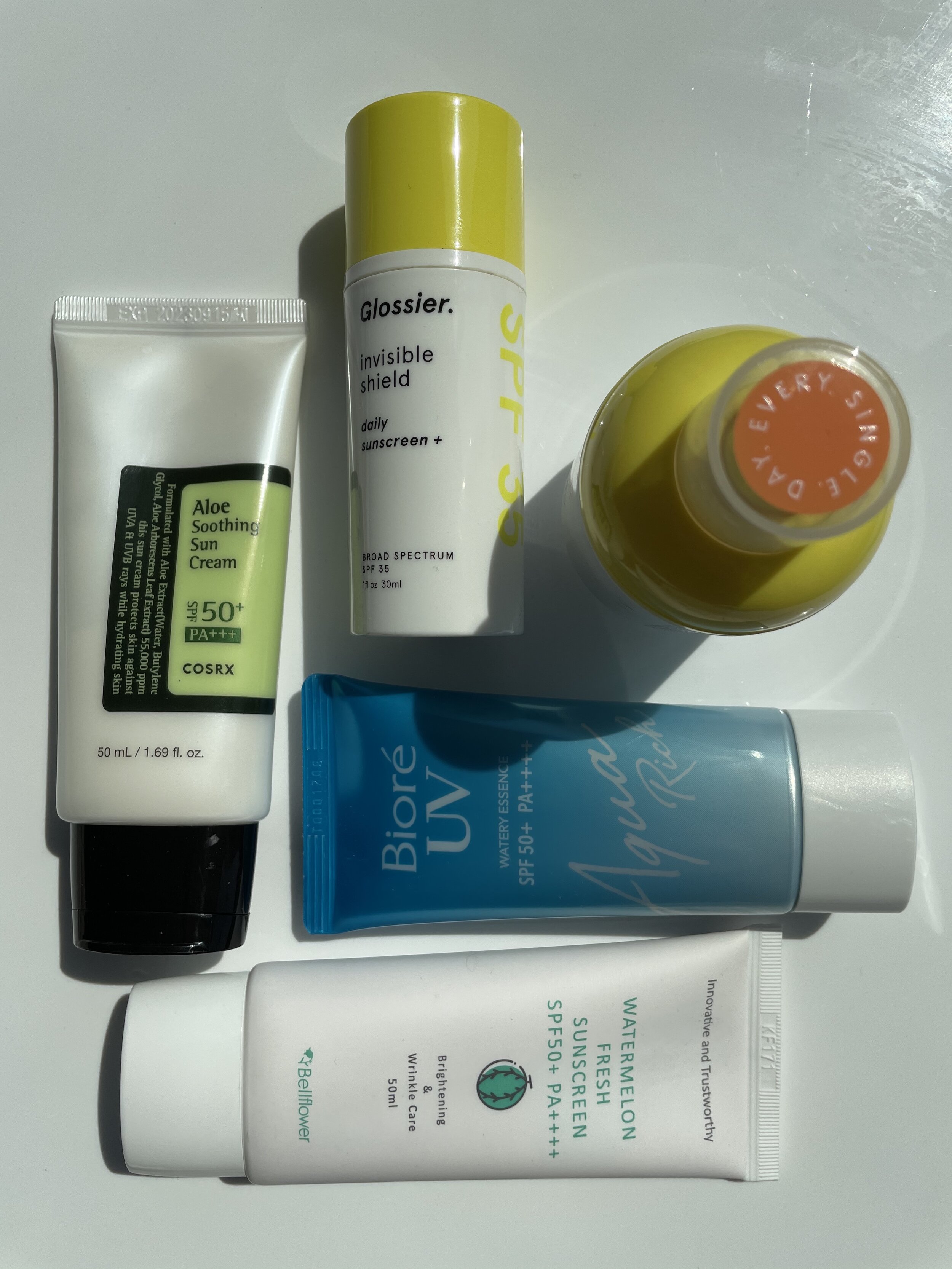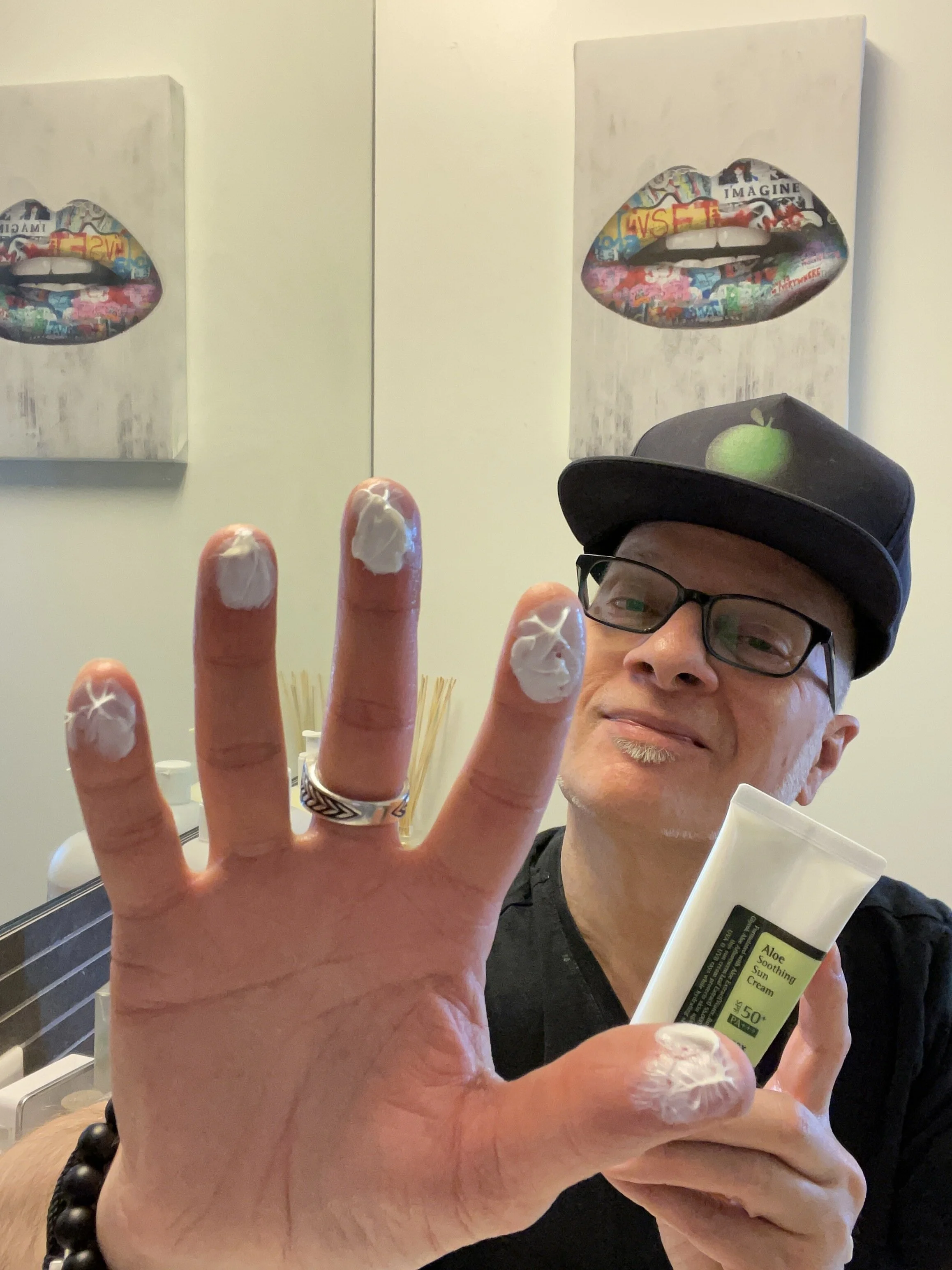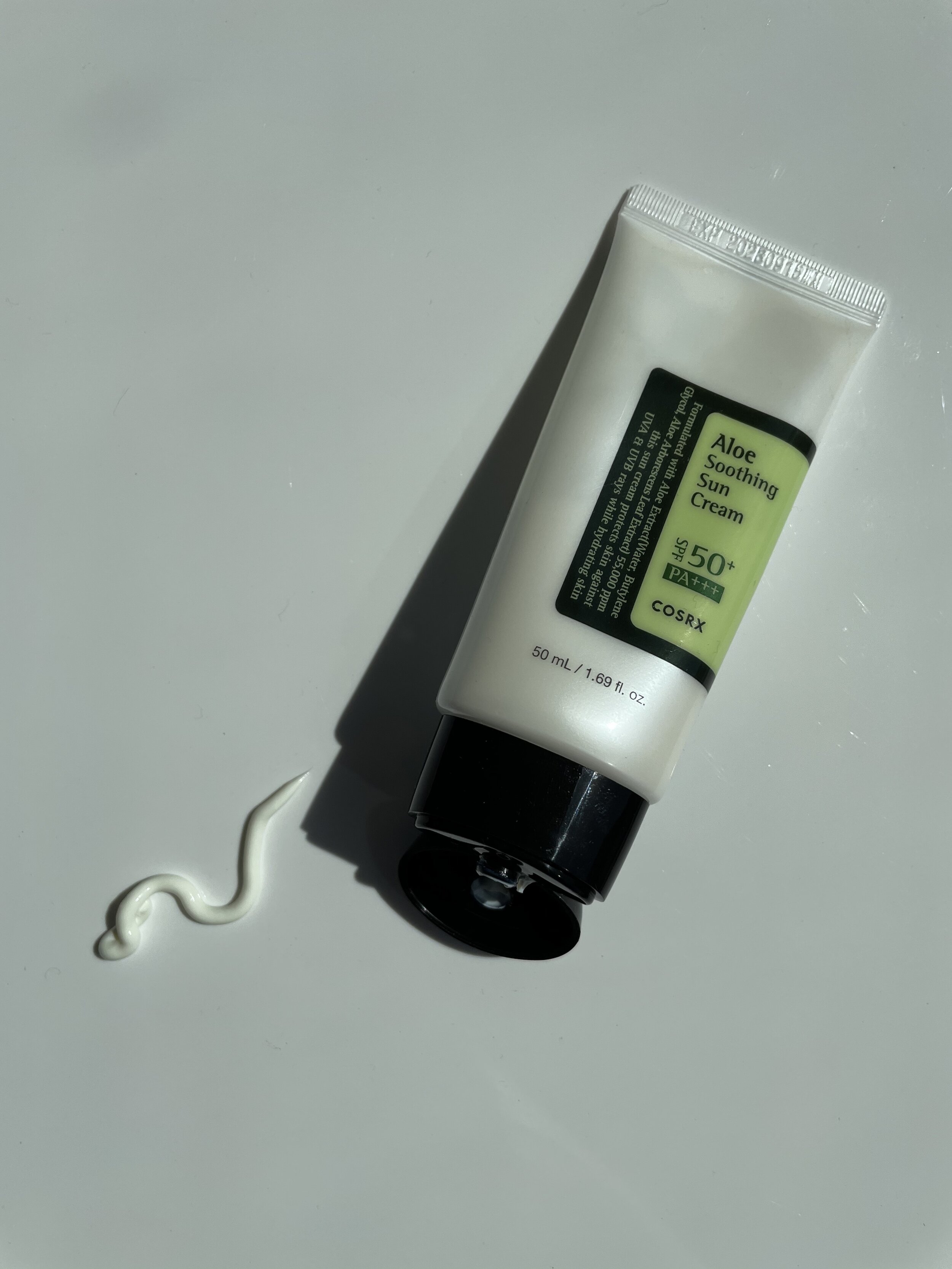PRODUCT REVIEW: COSRX ALOE SOOTHING SUN CREAM - BEST SUNSCREEN FOR FACE, BEST SUNSCREEN FOR SENSITIVE SKIN
COSRX | ALOE SOOTHING SUN CREAM
This review was originally part of my blog article titled, Super Light Sunscreens I'm Crushing on for Spring: Best Sunscreens for Face, Best Sunscreens for Oily Skin (And All Skin In Spring!) You can catch the full piece here.
—
No matter where I am in the world, no matter the climate, the one product I consider indispensable every day, all year round is sunscreen. It saddens me (it really does!) that so many people only wear sunscreen when it’s sunny out — and very often only in the summer months when the sun is peaking.
That’s just absurd. Sunscreen is vital every day. A simple truth I live by: if you can see the sun, the sun can see you. Sunscreen is the most valuable (make that invaluable!) anti-aging product available to us — every day of the year. Whenever asked for my recommendations for the best anti-aging creams, I always answer sunscreen!
One of my favorite sunscreens of all time is the Skin Aqua Super Moisture Milk from the Japanese personal care conglomerate Rohto. I’ve included it in multiple blog articles, including one of my faves, A Complete $100 Skincare Routine with The Inkey List, The Ordinary, Benton & More! (You can catch it here!)
PRODUCT REVIEW: SKIN AQUA SUPER MOISTURE MILK SPF 50 – ONE OF THE BEST SUNSCREENS FOR OILY SKIN
I’ve joked around about how Skin Aqua’s Super Moisture Milk is so exceptional that I suspect it may be some sort of alien technology that made its way to Earth. It’s just so otherworldly.
What’s important is that you find a sunscreen you love to use so much that you wouldn’t even think of skipping it.
What does PA mean in sunscreen?
There’s an excellent piece from the Paula’s Choice Research Team titled, What Does the PA+ Sunscreen Symbol Mean? on the brand’s website here.
The SPF rating on a sunscreen bottle stands for Sun Protection Factor, a measurement of how long you can stay outside during the day and be protected from the sun’s burn-causing UVB rays (assuming you’re applying sunscreen the right way). UVA rays are present, too; this is where the PA+ rating system comes into play.
Some sunscreens include PA+ rating on their products. The letters “PA” followed by plus signs (PA+, PA++, PA+++, and PA++++) on a label are a rating system developed in Japan to represent how much UVA protection the product offers.
The sun’s UVA rays do not cause sunburn; rather, they cause skin to turn brown. UVA rays are known as the sun’s silent killers because you don’t feel them affecting skin. Despite the lack of pain associated with UVA rays, they penetrate deeply into skin, causing a somewhat different type of damage than UVB rays.
This is what each PA rating means:
PA+ = Some UVA protection.
PA++ = Moderate UVA protection.
PA+++ = High UVA protection.
PA++++ = Extremely High UVA protection.
In my days working at Kiehl’s, we had a saying that has always stuck with me:
“It is essential to wear sunscreen even on cloudy seemingly sunless days.”
I believe that to this very day. And I practice it nearly every day. The pandemic has literally upended that ritual, too. I mean there have certainly been days where I’ve not left the apartment and thus don’t have an urgent need for sunscreen. And, over the past several weeks, the weather has been awful here in NYC. So, on days where it’s raining or fog-laden and I’m not going outside, I’ve been giving my skin a rest.
PRODUCT REVIEW: SUPERGOOP! BRIGHT-EYED 100% MINERAL EYE CREAM SPF 40 – BEST ANTI-AGING SUNCSREEN FOR EYES
But, spring is coming, and with it more intense sun rays — and, hopefully, a whole lot more sunny days to enjoy outside. (Not in sandals, of course!) So, it’s about the perfect time to have a look at a few lightweight sunscreens that I’ve been exploring — and really enjoying. Some are new to the market, some are just new to me.
Let’s have a look at one of the five new-to-me super light sunscreens I’m crushing on…
WATCH MY VIDEO REVIEW
COOL CLEAN FACIAL SUNSCREENS TO KEEP US SAFE AND SMILING IN THE SUN!
ON MY YOUTUBE CHANNEL HERE
COSRX | Aloe Soothing Sun Cream
Yeah, this was love at first site. If you know, you know. COSRX is a favorite of K-Beauty fans, me among them. Oddly, I haven’t given the brand enough love and am committed to exploring more from COSRX in the year ahead.
One of my favorite fermented toners of all time is the COSRX Galactomyces Alcohol-Free Toner. If you haven’t tried it, you’re really missing out. The COSRX Galactomyces Alcohol-Free Toner is a simple formula, comprising just 10 ingredients. (Funny, it’s all “top ten”!) Its star fermented active, Galactomyces Ferment Filtrate, is the second ingredient — after water. It’s simply divine.
PRODUCT REVIEW: COSRX GALACTOMYCES ALCOHOL-FREE TONER – BEST HYDRATING TONER
I don’t actually know when COSRX introduced their iconic Aloe Soothing Sun Cream. Yes, I’m just getting around to trying it for the very first time and I can’t put it down. Hey, as they say, better late than never, right?!
But you know what? I really want to know, so I googled it and discovered that the COSRX Aloe Soothing Sun Cream was first introduced in 2015 as COSRX’s first and only sunscreen until recently. So it took me six years to finally experience this magnificent K-Beauty sunscreen.
What’s the difference between mineral and chemical sunscreens?
For some real insights, there’s an excellent article by the Paula’s Choice Research Team titled, Mineral vs. Synthetic Sunscreen Ingredients available here. In the piece, the experts explain the differences and benefits between mineral and chemical sunscreens — and even dispel a myth or two:
“The two types of sunscreen ingredients are mineral and synthetic [chemical], and both are equally protective. Further reassuring is that each can be included in formulas created for every skin type. For example, if you have normal to oily skin, there are weightless, non-greasy options; if you have normal to dry skin, it’s possible to find skin-smoothing, hydrating SPF products.
What’s the Difference Between Mineral and Synthetic Sunscreen Ingredients?
The differences aren’t about which type is more effective; rather, it comes down to personal preference and how sensitive your skin is—mineral sunscreens are considered the most gentle options.
Mineral sunscreens: There are only two mineral sunscreen ingredients: titanium dioxideand zinc oxide. They work in skin's uppermost layers to both absorb and, to a lesser extent, deflect and scatter the sun’s harmful rays. These mineral ingredients are sometimes referred to as physical sunscreens or physical blockers, although that’s not a factual representation of how they work.
Synthetic sunscreens: There are over 30 synthetic sunscreen ingredients, all of which absorb into the top layers of skin, where they work similar to mineral sunscreens: by scattering and deflecting the sun’s harmful rays, and by converting UV rays into heat and “deactivating” them. (Don’t worry, you won’t feel a thing.) Common synthetic sunscreen ingredients include oxybenzone, octinoxate, octisalate, and avobenzone. These are sometimes labeled “chemical sunscreens,” which is both misleading and false. All skin care ingredients, even water, are chemicals.
The formula is a blend of five sunscreen filters, four of which are chemical. Only one of the filters is commonly found in the US. The others are all Asian or European sunscreen innovations, including: Amiloxate, Ensulizole and Tinosorb S. The lone mineral filter is Titanium Dioxide.
I know many people prefer to avoid chemical sunscreens. As I’ve said, what’s important is that you find a sunscreen you love to use so much that you wouldn’t even think of skipping it. If it’s a chemical one, so be it.
What makes the COSRX Aloe Soothing Sun Cream such a stand-out is its refreshing texture. It’s not overly lightweight, certainly not as light as the Supergoop! Daily Dose Vitamin C + SPF 40 Sunscreen Serum or the two J-Beauty icons the Skin Aqua Super Moisture Milk and Biore UV Aqua Rich Watery Essence.
But the Aloe Soothing Sun Cream has got a really nice, silky texture that’s more of a thick lotion than a runny milk or serum.
As the name asserts, there’s some aloe in the formula in the form of Aloe Arborescens Leaf Extract. (What happened to our old friend Barbadensis? She on vacation?) I wish that the chemists at COSRX had simply replaced the water at ingredient number one.
COSRX’s Aloe Soothing Sun Cream is not a perfect formula — with both denatured alcohol and a tiny amount of fragrance as the last ingredient in the INCI. Nor does it contain the kind of antioxidant botanical extracts I would expect from Korean skincare products. Hmm. Where’s the centella asiatica and the licorice root extract?
It’s clear that the COSRX Aloe Soothing Sun Cream is more of a straight-up, no-frills facial sunscreen. And at just under $13 a bottle, you kinda get what you pay for.
SHOP THE BLOG: Purchase the COSRX Aloe Soothing Sun Cream for $12.58 here.
A COMPLETE K-BEAUTY ROUTINE WITH THE BEST FACIAL SKINCARE FROM PURITO, COSRX, MISSHA & MORE!
The Ingredient List of the Supergoop! Ultra Daily Dose Vitamin C + SPF 40 Sunscreen Serum PA+++:
 aox|sb, C13-15 Alkane solv|emo, Glycerin
aox|sb, C13-15 Alkane solv|emo, Glycerin  sii|h 0 0, Polyglyceryl-6 Polyricinoleate emu, Polyglyceryl-6 Polyhydroxystearate emu, Octyldodecyl Citrate Crosspolymer h, Niacinamide
sii|h 0 0, Polyglyceryl-6 Polyricinoleate emu, Polyglyceryl-6 Polyhydroxystearate emu, Octyldodecyl Citrate Crosspolymer h, Niacinamide  cci|sb|aacne|h, Phenethyl Benzoate emo|perf, Polyester-25, Silica vc, Terminalia Ferdinandiana Fruit Extract aox|sb, Rosa Centifolia Flower Extract, Jasminum Officinale (Jasmine) Flower Extract perf, Bellis Perennis (Daisy) Flower Extract, Hydrolyzed Sodium Hyaluronate h, Sodium Hyaluronate
cci|sb|aacne|h, Phenethyl Benzoate emo|perf, Polyester-25, Silica vc, Terminalia Ferdinandiana Fruit Extract aox|sb, Rosa Centifolia Flower Extract, Jasminum Officinale (Jasmine) Flower Extract perf, Bellis Perennis (Daisy) Flower Extract, Hydrolyzed Sodium Hyaluronate h, Sodium Hyaluronate  sii|h 0 0, Pseudoalteromonas Ferment Extract
sii|h 0 0, Pseudoalteromonas Ferment Extract  so|h, Glyceryl Caprylate emo|emu, Disteardimonium Hectorite vc, Xanthan Gum vc, Polyglyceryl-2 Isostearate emu, Magnesium Sulfate vc, Sodium Chloride vc, Citric Acid buff, Trisodium Ethylenediamine Disuccinate chel, Sodium Citrate chel|buff, Pentylene Glycol solv|h, Propanediol solv|h, Caprylyl Glycol h|emo, Ethylhexylglycerin pres, Chlorphenesin pres|amic
so|h, Glyceryl Caprylate emo|emu, Disteardimonium Hectorite vc, Xanthan Gum vc, Polyglyceryl-2 Isostearate emu, Magnesium Sulfate vc, Sodium Chloride vc, Citric Acid buff, Trisodium Ethylenediamine Disuccinate chel, Sodium Citrate chel|buff, Pentylene Glycol solv|h, Propanediol solv|h, Caprylyl Glycol h|emo, Ethylhexylglycerin pres, Chlorphenesin pres|amicThe Ingredient List of the Glossier Invisible Shield Daily Sunscreen+ SPF 35:
 aox, Betaine
aox, Betaine  h, Acrylates Copolymer vc, Ammonium Acryloyldimethyltaurate/Vp Copolymer vc, Hydroxyacetophenone aox, Phenoxyethanol pres, Hydrolyzed Wheat Protein/Pvp Crosspolymer, Dibutyl Lauroyl Glutamide vc, Dibutyl Ethylhexanoyl Glutamide vc, Citrus Aurantium Dulcis (Orange) Peel Oil
h, Acrylates Copolymer vc, Ammonium Acryloyldimethyltaurate/Vp Copolymer vc, Hydroxyacetophenone aox, Phenoxyethanol pres, Hydrolyzed Wheat Protein/Pvp Crosspolymer, Dibutyl Lauroyl Glutamide vc, Dibutyl Ethylhexanoyl Glutamide vc, Citrus Aurantium Dulcis (Orange) Peel Oil  perf, Dipotassium Glycyrrhizate
perf, Dipotassium Glycyrrhizate  so|h, Carbomer vc 0 1, Tocopheryl Acetate aox 0 0, Aminomethyl Propanol buff, Butylene Glycol h|solv|vc 0 1, Hippophae Rhamnoides Fruit Extract, Disodium Edta chel|vc, Pentylene Glycol solv|h, Aloe Barbadensis Leaf Extract
so|h, Carbomer vc 0 1, Tocopheryl Acetate aox 0 0, Aminomethyl Propanol buff, Butylene Glycol h|solv|vc 0 1, Hippophae Rhamnoides Fruit Extract, Disodium Edta chel|vc, Pentylene Glycol solv|h, Aloe Barbadensis Leaf Extract  so|emo|h, Silica vc, Bioflavonoids so, Potassium Sorbate pres, Hydroxyphenyl Propamidobenzoic Acid
so|emo|h, Silica vc, Bioflavonoids so, Potassium Sorbate pres, Hydroxyphenyl Propamidobenzoic Acid  so, Brassica Oleracea Italica (Broccoli) Extract, Ethylhexylglycerin pres, Camellia Sinensis Leaf Extract
so, Brassica Oleracea Italica (Broccoli) Extract, Ethylhexylglycerin pres, Camellia Sinensis Leaf Extract  aox|so, Ascorbyl Palmitate
aox|so, Ascorbyl Palmitate  aox 0 2
aox 0 2The Ingredient List of the COSRX Aloe Soothing Sun Cream:
 sii|h 0 0, Propylene Glycol h|solv|vc 0 0, Cyclopentasiloxane emo|solv, Bis-Ethylhexyloxyphenol Methoxyphenyl Triazine
sii|h 0 0, Propylene Glycol h|solv|vc 0 0, Cyclopentasiloxane emo|solv, Bis-Ethylhexyloxyphenol Methoxyphenyl Triazine  sunsc, Phenylbenzimidazole Sulfonic Acid
sunsc, Phenylbenzimidazole Sulfonic Acid  sunsc, Dicaprylyl Carbonate emo, Isoamyl p-Methoxycinnamate sunsc, Potassium Cetyl Phosphate emu|surf, Alcohol
sunsc, Dicaprylyl Carbonate emo, Isoamyl p-Methoxycinnamate sunsc, Potassium Cetyl Phosphate emu|surf, Alcohol  amic|solv|vc, Dimethicone emo 0 1, Glyceryl Stearate emo|emu 0 1-2, Butylene Glycol h|solv|vc 0 1, Titanium Dioxide
amic|solv|vc, Dimethicone emo 0 1, Glyceryl Stearate emo|emu 0 1-2, Butylene Glycol h|solv|vc 0 1, Titanium Dioxide  sunsc|col, C14-22 Alcohols, Polymethyl Methacrylate, Cetearyl Alcohol emo|vc|emu|surf 1 2, PEG-100 Stearate surf|emu 0 0, Triethanolamine buff 0 2, Silica vc, Sodium Hydroxide buff, C12-20 Alkyl Glucoside emu|surf, Dimethicone/Vinyl Dimethicone Crosspolymer vc, Aluminum Hydroxide emo|h|vc, Stearic Acid emo|vc 0 2-3, Fragrance
sunsc|col, C14-22 Alcohols, Polymethyl Methacrylate, Cetearyl Alcohol emo|vc|emu|surf 1 2, PEG-100 Stearate surf|emu 0 0, Triethanolamine buff 0 2, Silica vc, Sodium Hydroxide buff, C12-20 Alkyl Glucoside emu|surf, Dimethicone/Vinyl Dimethicone Crosspolymer vc, Aluminum Hydroxide emo|h|vc, Stearic Acid emo|vc 0 2-3, Fragrance  perf, Caprylyl Glycol h|emo, Phenoxyethanol pres, Acrylates/C10-30 Alkyl Acrylate Crosspolymer vc, Aloe Arborescens Leaf Extract h|so, Dipotassium Glycyrrhizate
perf, Caprylyl Glycol h|emo, Phenoxyethanol pres, Acrylates/C10-30 Alkyl Acrylate Crosspolymer vc, Aloe Arborescens Leaf Extract h|so, Dipotassium Glycyrrhizate  so|h, Carbomer vc 0 1, Xanthan Gum vc, Tocopherol
so|h, Carbomer vc 0 1, Xanthan Gum vc, Tocopherol  aox 0-3 0-3, Amyl Acetate solv, Disodium EDTA chel|vc
aox 0-3 0-3, Amyl Acetate solv, Disodium EDTA chel|vcThe Ingredient List of the Bellflower Watermelon Fresh Sunscreen:
 sii|h 0 0, C12-15 Alkyl Benzoate emo|amic, 1,2-Hexanediol solv, Behenyl Alcohol emo|vc, Diethylamino Hydroxybenzoyl Hexyl Benzoate
sii|h 0 0, C12-15 Alkyl Benzoate emo|amic, 1,2-Hexanediol solv, Behenyl Alcohol emo|vc, Diethylamino Hydroxybenzoyl Hexyl Benzoate  sunsc, Niacinamide
sunsc, Niacinamide  cci|sb|aacne|h, Citrullus Vulgaris (Watermelon) Fruit Extract(11,700 Ppm)
cci|sb|aacne|h, Citrullus Vulgaris (Watermelon) Fruit Extract(11,700 Ppm)  aox, Bis-Ethylhexyloxyphenol Methoxyphenyl Triazine
aox, Bis-Ethylhexyloxyphenol Methoxyphenyl Triazine  sunsc, Polymethyl Methacrylate, Silica vc, Sodium Acrylate/Sodium Acryloyldimethyl Taurate Copolymer vc, Potassium Cetyl Phosphate emu|surf, Polyisobutene vc, Ammonium Acryloyldimethyltaurate/VP Copolymer vc, Centella Asiatica Extract
sunsc, Polymethyl Methacrylate, Silica vc, Sodium Acrylate/Sodium Acryloyldimethyl Taurate Copolymer vc, Potassium Cetyl Phosphate emu|surf, Polyisobutene vc, Ammonium Acryloyldimethyltaurate/VP Copolymer vc, Centella Asiatica Extract  so|aox|h, Caprylyl/Capryl Glucoside surf, Sorbitan Oleate emu 0 3, Adenosine
so|aox|h, Caprylyl/Capryl Glucoside surf, Sorbitan Oleate emu 0 3, Adenosine  cci, Disodium EDTA chel|vc, Ci 77491 col 0 0, Sodium Hyaluronate
cci, Disodium EDTA chel|vc, Ci 77491 col 0 0, Sodium Hyaluronate  sii|h 0 0
sii|h 0 0The Ingredient List of the Biore UV Aqua Rich Watery Essence SPF 50+ PA++++:
 amic|solv|vc, Ethylhexyl Methoxycinnamate sunsc 0 0, Ethylhexyl Triazone
amic|solv|vc, Ethylhexyl Methoxycinnamate sunsc 0 0, Ethylhexyl Triazone  sunsc, Isopropyl Palmitate emo|perf 1 3-4, Lauryl Methacrylate/Sodium Methacrylate Crosspolymer, Diethylamino Hydroxybenzoyl Hexyl Benzoate
sunsc, Isopropyl Palmitate emo|perf 1 3-4, Lauryl Methacrylate/Sodium Methacrylate Crosspolymer, Diethylamino Hydroxybenzoyl Hexyl Benzoate  sunsc, Hydrogenated Polyisobutene emo|vc 2 1, Bisethylhexyloxyphenol Methoxyphenyl Triazine
sunsc, Hydrogenated Polyisobutene emo|vc 2 1, Bisethylhexyloxyphenol Methoxyphenyl Triazine  sunsc, Dextrin Palmitate emu|surf, BG h|solv|vc 0 1, Xylitol
sunsc, Dextrin Palmitate emu|surf, BG h|solv|vc 0 1, Xylitol  h, Acrylates/C10-30 Alkyl Acrylate Crosspolymer vc, Dimethicone emo 0 1, Alkyl Benzoate (C12-15) emo|amic, Glycerin
h, Acrylates/C10-30 Alkyl Acrylate Crosspolymer vc, Dimethicone emo 0 1, Alkyl Benzoate (C12-15) emo|amic, Glycerin  sii|h 0 0, Glyceryl Stearate emo|emu 0 1-2, Propanediol solv|h, Glyceryl Behenate emo|emu, Vinyl Dimethicone/Methicone Silsesquioxane Crosspolymer vc, Cetanol emo|emu|vc|surf 2 2, Agar vc, Sorbitan Distearate emo, Isoceteth-20 emu|surf, Polyvinyl Alcohol vc, Dimethicone/Vinyl Dimethicone Crosspolymer vc, Stearoyl Glutamic Acid surf, Arginine
sii|h 0 0, Glyceryl Stearate emo|emu 0 1-2, Propanediol solv|h, Glyceryl Behenate emo|emu, Vinyl Dimethicone/Methicone Silsesquioxane Crosspolymer vc, Cetanol emo|emu|vc|surf 2 2, Agar vc, Sorbitan Distearate emo, Isoceteth-20 emu|surf, Polyvinyl Alcohol vc, Dimethicone/Vinyl Dimethicone Crosspolymer vc, Stearoyl Glutamic Acid surf, Arginine  sii, Hydroxide K buff, Hydroxide Na buff, Royal Jelly Extract, Na Hyaluronate
sii, Hydroxide K buff, Hydroxide Na buff, Royal Jelly Extract, Na Hyaluronate  sii|h 0 0, Phenoxyethanol pres, EDTA 2Na chel|vc, BHT aox|pres, Fragrance
sii|h 0 0, Phenoxyethanol pres, EDTA 2Na chel|vc, BHT aox|pres, Fragrance  perf
perf
















